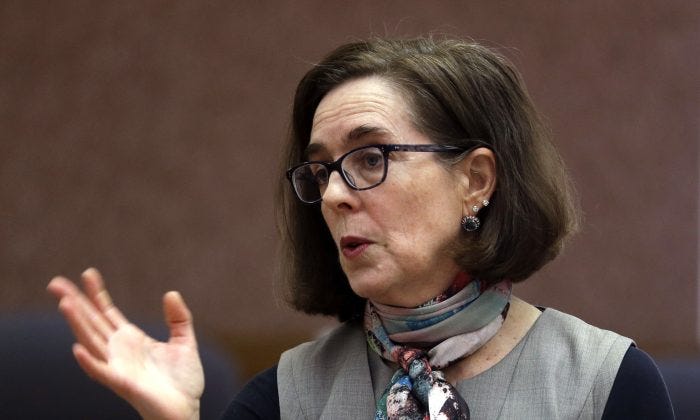Dear Reader,
After a couple of full days in the office this week and a few days of staycation (during which I had to go in to the office for a few hours each day) with my parents visiting here in Bozeman, we’re finally off this morning for a weekend trip to Flathead Lake and Glacier National Park.
While I don’t have a feature article for you, I still have a Letter to the Editor update, a few extended Hot Takes, a Posterity post, a documentary Peaches’ Pick, and some Fresh & Random Linkage that should tide you over until next week.
But first, as it’s been a pretty quiet mail week, let me share in its entirety this email from a young mom in response to last week’s newsletter on engaging the culture:
“I wanted to tell you how much I appreciate your thoughtful and charitable writing on Substack. It has provided me a weekly glance at what’s going on beyond my immediate sphere of raising young boys into young men and provides the ‘brain granola’ to keep me sane and a timely antidote for the ‘starved for adult interaction’ common among homemaking mothers. Your final word, with accompanying picture, in your most recent Substack was perfectly placed and resulted in an out loud laugh that startled my son as we sat at the breakfast table.
I, too, like your friend from Kansas City, have been thinking about and struggling with how to engage with our culture in a compassionate and caring way while also bravely sharing Truth. I find myself wanting to engage in this country-wide discussion of race-relations, gender-fluidity, etc., but I am very timid and afraid of offending or being misunderstood. I also realize that social media platforms are probably the hardest avenue through which to have this dialogue and discussion.
Lately I’ve been thinking about my reading diet and wanting to expand it beyond my comfort zone to read others and opinions that are more strikingly different than my own. As I was searching for a new book to read, I decided to search for a black Christian author to intentionally spend time listening to someone who has experienced different challenges and experiences than I.
The book I selected, compliments of what was available at our local library, was I’m Still Here: Black Dignity in a World Made for Whiteness by Austin Channing Brown. She begins by saying that her name was given to her for a two-fold reason. It was her grandmother’s maiden name and secondly because her parents wanted her name to be a white-male’s name to help her in the job application process as an adult. She is told this second real reason around the time she is 7 years old (after being scrutinized by the local librarian who doubts that her library card is indeed hers).
It has been an interesting read and one that I am wrestling with. More questions than answers arise and I want to better understand. I wish that I could grab coffee with someone like Austin to talk through (mostly by listening) the issues she raises (whiteness, white supremacy, white privilege, etc.). I think I might be hard pressed to find someone in person here, but I can at least listen while I read and be more intentional about reading more (from authors like Austin) to hopefully better understand.
Thank you for modeling how to engage with these complex issues our culture is wrestling with today. Also if you have any authors or books to recommend, I’m open to suggestions.”
I haven't read Brown's, but along the lines of more recently-published books on racial struggles, I appreciated The Color of Compromise by Jemar Tisby, Just Mercy by Bryan Stephenson (the movie is also excellent), and have Reading While Black by Esau McCauley on tap for the fall. I also enjoy John McWhorter's Substack newsletter, which usually comes out on Fridays.
A quick thought: While Jesus calls all of us to engage the world, there are stages of life that are more conducive to different levels than others. Me at 50 with four grown kids affords more time than you in your thirties with multiple little ones; I say this so as not to put upon you some imperative (engage the culture) to replace your current imperative (train your children in the fear and admonition of the Lord). It’s not that the two are mutually exclusive, but they do have to be ordered. Granted, your current stage of life will afford you opportunities that mine does not (let’s just say that I'm not involved with too many young mothers groups) and you'll want to take advantage of those, but you have more day-to-day/hour-to-hour responsibilities than I do, so keep that in mind. There will be more time later.
As always, thanks for reading!
Craig
P.S.: As a reminder, you’re welcome and encouraged to email me directly with feedback, ideas, links, etc. at cmdunham [at] gmail [dot] com. Just know that, unless you specifically tell me not to, I may quote you here (though it will always be anonymously).
Letter to the Editor Update
For the tens of you who wondered as to the status of my request of the Bozeman Chronicle to be able to submit a second letter or guest editorial after MSU professor Sara Rushing’s published critique (see last week’s newsletter), here’s what they said:
“Craig,
We try to ensure a full month passes between letters by the same person to keep the space open for a variety of voices. Letters that are responses to other letters come in frequently. While this is the first time I've personally dealt with a request like yours, I don't want to break that overarching policy to allow a response.
I would not be interested in a column on the subject.
Sorry that the answer might not be what you hoped for, and thank you for submitting a letter in the first place. I enjoy seeing the variety of viewpoints that come through that portal.
Michael Wright
Managing Editor”
A fair response, I thought, for which I emailed him back and thanked him. I then sent the following to Professor Rushing:
“Sara,
Well, our potential joust in the pages of the Chronicle is not to be (see Mr. Wright’s email below). Looks like we’ll have to settle for coffee (which is more fun anyway).
I tried,
Craig”
She responded as follows:
“Alas. The Chronicle has some strict rules, I guess. I’ve run into them, too.
Thanks for inquiring. We’ll just have to keep our correspondence going month by month, instead of in one actual editorial. Or they could offer us a monthly column called something like “What we can agree on…”? Ha!
I’ll take you up on coffee again sometime soon. With the impending semester and lots of family coming through, I’m treading water for the next few weeks.
Best,
Sara”
Folks, contrary to what too many would have us believe, we can disagree without hating each other. Keep the issue the issue and love each other in the meantime.
Next up: coffee.
Hot Takes
“St. Louis Cab Company Refuses Service to Masked, Vaccinated Customers” - I suppose it was inevitable, but this “tit for tat” strategy discriminating against those vaccinated or choosing to wear a mask seems the ditch on the other side of the vaccine road that we should avoid:
“A cab company in Missouri has rolled out a new rule for the COVID-19 vaccinated: If you’ve taken ‘the injection,’ you’ll be denied service.
The same rule applies to wearing a mask.
…What’s good for a business that is allowed to mandate the shots, is good for a business that doesn’t.”
Look, get vaccinated or don’t get vaccinated, but don’t abuse other people either way with your right to do one or the other. This is a medical issue, not a political or commercial one (though let’s not pretend there haven’t been implications), and while it’s been poorly handled by literally everyone in power who has touched it, that doesn’t mean we have to make it worse by shaming people and whatever decisions they make.
Christians, please stop guilt-tripping one another with the “if you don’t get vaccinated or wear a mask, you aren’t loving your neighbor” rhetoric. Now that the vaccine is freely available and 60% of the country have chosen to get it, how about taking the much more charitable approach of, “if you do or don’t get vaccinated or wear a mask, I’m going to trust you’ve sought wise counsel (medical and pastoral) in your community, asked God to shape your conscience and convictions, and have your reasons”? The last thing we need are a bunch of junior Holy Spirits running around proselytizing for or condemning those masking and getting vaccinated.
(Full disclosure: Megan and I have been vaccinated and are contemplating whether to get boosters. Per our doctor’s recommendation, we have encouraged our daughters not to get vaccinated until at least a year’s worth of data is available for study and evaluation, but it’s their decision to make, which they each have.)
“Oregon Governor Signs Bill Letting Students Graduate Without Proving They Can Read, Write, or Do Math” - This one’s more than a little sketchy. On the surface, the move seems in response to the impact of Covid on student learning:
“Oregon’s governor recently signed legislation that allows high school students to graduate without proving they can read, write, or do math.
Oregon Senate Bill 744 (pdf) states that students ‘may not be required to show proficiency in Essential Learning Skills as a condition of receiving a high school diploma’ in the next three school years.
This 2021 Act being necessary for the immediate preservation of the public peace, health and safety, an emergency is declared to exist, and this 2021 Act takes effect on its passage, it states.”
But the way this was rolled out - that is, without the normal “look at me” fanfare so prevalent in politics - as well as statements and actions made after the fact makes me question what’s really behind the move:
“…The Oregon House approved the bill 38–18 in June, followed by the state Senate in a 16–13 vote. Oregon Gov. Kate Brown, a Democrat, quietly signed the bill into law last month; her office didn’t announce the signing. That move wasn’t entered into the legislative database for about two weeks, until July 29, and people who signed up for alerts on action on the bill never received one, The Oregonian reported.”
Could there be more at play here than just Covid-related issues? I think so.
“Charles Boyle, an aide to the governor, told the paper that suspending the proficiency requirements will benefit ‘Oregon’s black, Latino, Latina, Latinx, Indigenous, Asian, Pacific Islander, tribal, and students of color.’
‘Leaders from those communities have advocated time and again for equitable graduation standards, along with expanded learning opportunities and supports,’ he said.
Okay, so this is really about equitable standards - which I’m all for - but completely removing all of them is not the way to solve this problem. Columbia University linguist John McWhorter, writing in his Substack newsletter and elaborating on his article, “The Problem With Dropping Standards in the Name of Racial Equity,” in The Atlantic, has had much to say on the topic. He writes,
“We can have a conversation about whether standardized tests are fair, about whether there might be other ways of fairly assessing students, about whether classical texts really need to be encountered in the languages they were written in. However, to have those conversations within the context of excusing black students from challenge is, in my view, impermissible and yes, in its way, racist.
…No. You don’t get past racism by creating new forms of it. Scrapping traditional challenges should only be on the table after black kids have mastered the challenge anyway.”
Professor Jonathan Turley accurately sums up my personal take on the matter (though he seems more pro-standardized tests, whereas I’m more pro-standards, period). It’s a long quote and an even longer article, but both are worth the read):
“With states like Oregon now eliminating the need to establish proficiency on basic subjects with standardized tests, American education faces the perfect storm. Despite record expenditures on public schools, we are still failing students, particularly minority students, in teaching the basis subjects needed to succeed in life. We will then graduate the students by removing testing barriers for graduation. Then some may go to colleges and universities that have eliminated standardized testing for admission. At every stage in their education, they have been pushed through by educators without objective proof that they are minimally educated. That certainly guarantees high graduation rates or improved diversity admissions. However, these students are still left at a sub-proficient state as they enter an increasingly competitive job market and economy. Any failures will come down the road when they will be asked to write, read, or add by someone who is looking for actual work product. They will then be outside of the educational system and any failures will not be attributed to public educators.”
None of this is about Covid; this is about creating more people dependent on government for what they could be taught to learn and do for themselves. If you can read, thank a teacher or a parent, and then be sure to do so between the lines.
“Batman's Sidekick Robin Comes Out. It Makes Sense, If You Were Paying Attention” - I wasn’t, but I’m hardly surprised.
Post(erity): “On the Finland Phenomenon”
Each week, I choose a post from the past that seems apropos of something (of course, you’re always welcome to search the archives yourself whenever you like).
With school years officially starting around the country (and with the hope of providing some proactive solutions better than Oregon’s above), this week’s Post(erity) post - “On the Finland Phenomenon” - is from May 6, 2011, and reviews a documentary on the Finnish educational system. An excerpt:
“The fact is that Finland, particularly in the past 25 years, has really figured some things out on the educational front. And, while few of their discoveries seem little more than common sense, their commitment to functioning within and by what they've discovered (or re-discovered) is to be admired. It may seem naïve, but Finland seems to be proving that education is not rocket science when an entire culture adopts a ‘less is more’ mentality concerning it; if anything, ‘less is more’ seems to work.”
Peaches’ Picks: Val
Peaches and I (and our family) recently watched actor Val Kilmer’s self-produced Amazon Prime documentary, Val - a hard but beautiful look at someone struggling and succeeding to make sense of sad things toward the end of his life.
Going in, I was afraid this was going to be little more than narcissistic navel-gazing via home video clips, but it was a very poignant and touching work that went beyond Kilmer himself (though there’s no doubt the writing and editing were very kind and painted him in the best of lights; it could have benefitted from a more self-critique).
I liked Kilmer on-screen (favorite roles: Doc Holliday in Tombstone, Simon Templar in The Saint; Jim Morrison in The Doors; and the voices of Moses and God in The Prince of Egypt), and his documentary makes me think I would like him in person as well.
It’s sad to see what throat cancer and the accompanying chemotherapy treatments have done to his body, but it’s inspiring to see him push on nevertheless, particularly with his now-adult children, both of whom seem to genuinely love and care for him.
Fresh & Random Linkage
“Dolly Parton Releasing Album with Her First Novel, a Thriller Titled 'Run, Rose, Run,' in 2022” - I can’t speak to her choice of co-author James Patterson as I’ve never read anything by him, but Dolly’s creative touch is usually a good one.
“Milwaukee Brewers' Corbin Burnes Ties Record with 10 Straight Strikeouts” - Yeah, it was only against the Cubs - and a gutted version at that - but still…
“Mike Richards Confirmed as ‘Jeopardy!’ Host, Mayim Bialik to Front Primetime Specials” - As my mother reminded me yesterday, I used to like game shows, but as I reminded her, I was six. Who signs up for stuff like this (and why)?
Until next time.
Why Subscribe?
Why not? Second Drafts is a once-a-week newsletter delivered to your inbox (you can also read it online or through your RSS reader) and it’s totally free.
Keep Connected
You’re welcome to follow me on Twitter.








